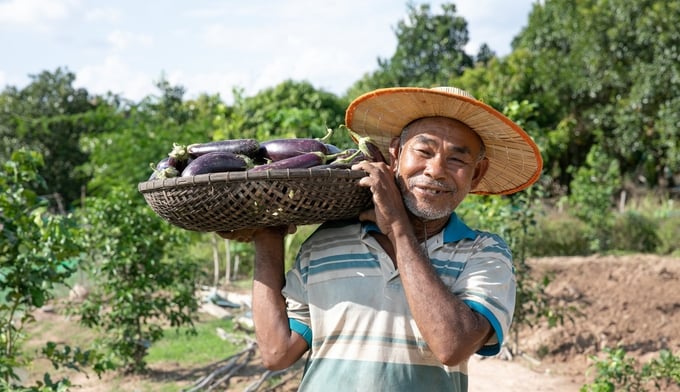May 20, 2025 | 19:51 GMT +7
May 20, 2025 | 19:51 GMT +7
Hotline: 0913.378.918
May 20, 2025 | 19:51 GMT +7
Hotline: 0913.378.918

One year ago, the United Nations established the UN Food Systems Coordination Hub.
The UN Food Systems Coordination Hub (the Hub) convened today a virtual dialogue between the Food Systems National Conveners and the Director-General of the Food and Agriculture Organization of the United Nations (FAO), QU Dongyu. Attended by over 200 participants, the dialogue welcomed Ministers for Agriculture and high-level national officials.
“We can turn the tide through the transformation to more efficient, more inclusive, more resilient, and more sustainable agrifood systems,” Qu told representatives from around 100 countries.
The officials came together to share their efforts and ideas in planning and implementing their national pathways for agrifood systems transformation to reduce hunger, poverty, and food loss and waste, protect biodiversity and tackle climate change.
“To achieve the ambitious, transformative changes required, we need to change policies, mindsets, and business models, and each of you must take the lead in this,” the FAO DG underscored.
A fully functional support hub
One year ago, the United Nations established the UN Food Systems Coordination Hub, which is hosted by FAO on behalf of the UN System and supported by the International Fund for Agricultural Development (IFAD), the World Health Organization(WHO), the World Food Program (WFP), the UN Environmental Programme (UNEP), and the United Nations Development Coordination Office (UNDCO).
The Hub’s primary role is to support countries to develop further and implement their national agrifood systems transformation pathways.
“FAO, together with partners, and all relevant stakeholders, is providing technical expertise and professional solutions to support these changes…and continues to lead efforts to support national transformation plans in a time of unprecedented challenges,” Qu explained.
The Director-General further informed that the Food Systems Stocktaking Moment (STM) will take place in July 2023. Together with regional preparatory meetings this year, this milestone event will provide opportunities to report on progress made at the national level since the UN Food Systems Summit in 2021.
The outcomes of the STM will be an important input to the Sustainable Development Goals Summit in September 2023.
“The historic task we are facing is clear: defining a holistic, coordinated approach to transform our agrifood systems,” he highlighted.
Nations committed
At the dialogue, dozens of National Conveners and officials responsible for leading the implementation of plans for agrifood systems transformation described priorities and actions that are delivering on the commitments made at the 2021 UN Food Summit.
They also outlined some of the challenges they face to transform their agrifood systems, such as the impacts of conflicts and climate change as well as access to food and agriculture inputs. Moreover, the leaders highlighted the importance of linking agrifood systems policies to solutions that help overcome the triple planetary challenges of climate change, biodiversity loss and pollution.
The FAO DG assured that the Hub will continue to support these critical links by creating added value through the Organization’s knowledge, information, and technical expertise, with the support of the UN Agencies, while avoiding duplication of work.
Held during the annual UN General Assembly high-level week in New York in 2021, the UN Food Systems Summit closed with the tagline “From New York back to Rome”.
FAO is also using its flagship programmes – such as the Hand-in-Hand Initiative, the Investment Forum and the 1000 Digital Villages—as important mechanisms for accelerating the transformation of agrifood systems at the country level and mobilizing the required investment.
A vital role
For Qu, the role of the Food Systems National Convenors is vital for the well-being of billions of people.
“Our agrifood systems are not delivering effectively. Conflicts, the climate crisis, and the pandemic, have aggravated the situation, increasing the number of hungry people, intensifying inequalities and jeopardizing progress made in the past decades,” he warned.
Qu underscored that transforming agrifood systems is a unique opportunity to achieve results at scale, in line with national priorities, while addressing the impacts of the climate crisis.
“Leveraging finance for agrifood systems transformations is one of the most catalytic actions needed for achieving the SDGs - if we get it right, our agrifood systems can be profitable, equitable, sustainable, healthy, and more resilient to shocks”, he explained, adding that it is also necessary to invest in science, innovation, and technology.
Finally, the FAO DG reminded participants that the effective implementation of National Pathways—the country’s plans for agrifood systems that are sustainable and equitable— can deliver urgent change to ensure progress on multiple Sustainable Development Goals.
“National ownership and the leadership of the National Conveners are key to successful agrifood systems transformation”, Qu said, reiterating that the UN Food Systems Coordination Hub is ready to support and empower them.
(FAO.org)

(VAN) Attempts to bring down the price of the Japanese staple have had little effect amid a cost-of-living crisis.

(VAN) Fourth most important food crop in peril as Latin America and Caribbean suffer from slow-onset climate disaster.

(VAN) Shifting market dynamics and the noise around new legislation has propelled Trouw Nutrition’s research around early life nutrition in poultry. Today, it continues to be a key area of research.

(VAN) India is concerned about its food security and the livelihoods of its farmers if more US food imports are allowed.

(VAN) FAO's Director-General emphasises the need to work together to transform agrifood systems.

(VAN) Europe is facing its worst outbreak of foot-and-mouth since the start of the century.

(VAN) The central authorities, in early April, released a 10-year plan for rural vitalization.